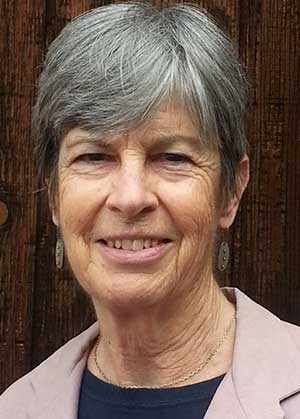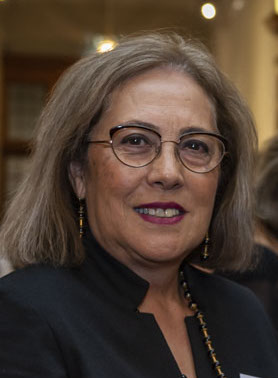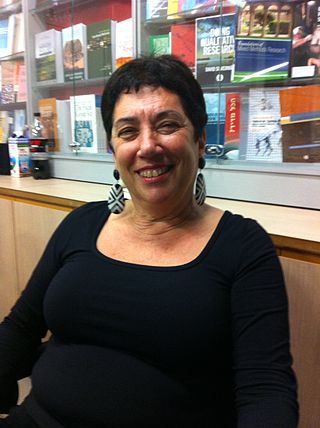Related Research Articles

Anne Fausto-Sterling is an American sexologist who has written extensively on the biology of gender, sexual identity, gender identity, gender roles, and intersexuality. She is the Nancy Duke Lewis Professor Emerita of Biology and Gender Studies at Brown University.
Women's studies is an academic field that draws on feminist and interdisciplinary methods to place women's lives and experiences at the center of study, while examining social and cultural constructs of gender; systems of privilege and oppression; and the relationships between power and gender as they intersect with other identities and social locations such as race, sexual orientation, socio-economic class, and disability.
Filipino psychology, or Sikolohiyang Pilipino, in Filipino, is defined as the psychology rooted on the experience, ideas, and cultural orientation of the Filipinos. It was formalized in 1975 by the Pambansang Samahan sa Sikolohiyang Pilipino under the leadership of Virgilio Enriquez, who is regarded by many as the father of Filipino Psychology. Sikolohiyang Pilipino movement is a movement that created to address the colonial background in psychology in the country. It focuses on various themes such as identity and national consciousness, social awareness, and involvement, and it uses indigenous psychology to apply to various fields such as religion, mass media, and health. The movement has three main areas of protest.
Native American studies is an interdisciplinary academic field that examines the history, culture, politics, issues, spirituality, sociology and contemporary experience of Native peoples in North America, or, taking a hemispheric approach, the Americas. Increasingly, debate has focused on the differences rather than the similarities between other Ethnic studies disciplines such as African American studies, Asian American Studies, and Latino/a Studies.
The gender binary is the classification of gender into two distinct, opposite forms of masculine and feminine, whether by social system, cultural belief, or both simultaneously. Most cultures use a gender binary, having two genders.
Feminist philosophy is an approach to philosophy from a feminist perspective and also the employment of philosophical methods to feminist topics and questions. Feminist philosophy involves both reinterpreting philosophical texts and methods in order to supplement the feminist movement and attempts to criticise or re-evaluate the ideas of traditional philosophy from within a feminist framework.

Helen Elizabeth Longino is an American philosopher of science who has argued for the significance of values and social interactions to scientific inquiry. She has written about the role of women in science and is a central figure in feminist epistemology and social epistemology. She is the Clarence Irving Lewis Professor of Philosophy at Stanford University. In 2016, she was elected to the American Academy of Arts and Sciences.
Indigenous decolonization describes ongoing theoretical and political processes whose goal is to contest and reframe narratives about indigenous community histories and the effects of colonial expansion, cultural assimilation, exploitative Western research, and often though not inherent, genocide. Indigenous people engaged in decolonization work adopt a critical stance towards western-centric research practices and discourse and seek to reposition knowledge within indigenous cultural practices.

An unstructured interview or non-directive interview is an interview in which questions are not prearranged. These non-directive interviews are considered to be the opposite of a structured interview which offers a set amount of standardized questions. The form of the unstructured interview varies widely, with some questions being prepared in advance in relation to a topic that the researcher or interviewer wishes to cover. They tend to be more informal and free flowing than a structured interview, much like an everyday conversation. Probing is seen to be the part of the research process that differentiates the in-depth, unstructured interview from an everyday conversation. This nature of conversation allows for spontaneity and for questions to develop during the course of the interview, which are based on the interviewees' responses. The chief feature of the unstructured interview is the idea of probe questions that are designed to be as open as possible. It is a qualitative research method and accordingly prioritizes validity and the depth of the interviewees' answers. One of the potential drawbacks is the loss of reliability, thereby making it more difficult to draw patterns among interviewees' responses in comparison to structured interviews. Unstructured interviews are used in a variety of fields and circumstances, ranging from research in social sciences, such as sociology, to college and job interviews. Fontana and Frey have identified three types of in depth, ethnographic, unstructured interviews - oral history, creative interviews, and post-modern interviews.
Feminist epistemology is an examination of epistemology from a feminist standpoint.

Linda Tuhiwai Te Rina Smith was a professor of indigenous education at the University of Waikato in Hamilton, New Zealand and is now Distinguished Professor at Te Whare Wānanga o Awanuiārangi. The daughter of Sidney Moko Mead, she affiliates to the Ngāti Awa and Ngāti Porou iwi.

Decoloniality is a school of thought that aims to delink from Eurocentric knowledge hierarchies and ways of being in the world in order to enable other forms of existence on Earth. It critiques the perceived universality of Western knowledge and the superiority of Western culture, including the systems and institutions that reinforce these perceptions. Decolonial perspectives understand colonialism as the basis for the everyday function of capitalist modernity and imperialism. Decoloniality emerged as part of a Latin American movement examining the role of the European colonization of the Americas in establishing Eurocentric modernity/coloniality.
Alison Mary Jaggar is an American feminist philosopher born in England. She is College Professor of Distinction in the Philosophy and Women and Gender Studies departments at the University of Colorado, Boulder and Distinguished Research Professor at the University of Birmingham in the United Kingdom. She was one of the first people to introduce feminist concerns in to philosophy.
Levi Suydam was a property-holding intersex person who lived in the 19th century. In 1843, at a local election in Salisbury, Connecticut, Suydam was presented to the town selectmen as a male property holder, the requirements for being validated as a voter. This was called into question and he was subjected to repeat examinations and questioning of his sex.
Feminist empiricism is a perspective within feminist research that combines the objectives and observations of feminism with the research methods and empiricism. Feminist empiricism is typically connected to mainstream notions of positivism. Feminist empiricism critiques what it perceives to be inadequacies and biases within mainstream research methods, including positivism.
Feminist biology is an approach to biology that is concerned with the influence of gender values, the removal of gender bias, and the understanding of the overall role of social values in biological research and practices. Feminist biology was founded by, among others, Dr. Ruth Bleier of the University of Wisconsin-Madison. It aims to enhance biology by incorporating feminist critique in matters varying from the mechanisms of cell biology and sex selection to the assessment of the meaning of words such as "gender" and "sex". Overall, the field is broadly defined and pertains itself to philosophies behind both biological and feminist practice. These considerations make feminist biology debatable and conflictive with itself, particularly when concerning matters of biological determinism, whereby descriptive sex terms of male and female are intrinsically confining, or extreme postmodernism, whereby the body is viewed more as a social construct. Despite opinions ranging from determinist to postmodernist, however, biologists, feminists, and feminist biologists of varying labels alike have made claims to the utility of applying feminist ideology to biological practice and procedure.

Feminist philosophy of science is a branch of feminist philosophy that seeks to understand how the acquirement of knowledge through scientific means has been influenced by notions of gender identity and gender roles in society. Feminist philosophers of science question how scientific research and scientific knowledge itself may be influenced and possibly compromised by the social and professional framework within which that research and knowledge is established and exists. The intersection of gender and science allows feminist philosophers to reexamine fundamental questions and truths in the field of science to reveal how gender biases may influence scientific outcomes. The feminist philosophy of science has been described as being located "at the intersections of the philosophy of science and feminist science scholarship" and has attracted considerable attention since the 1980s.

Shulamit Reinharz was the Jacob Potofsky Professor of Sociology at Brandeis University until 2017. During her tenure at Brandeis, she was director of the women's studies program from 1991 to 2001 and launched The Scholars Program, the first graduate program to focus on Jewish women. She was the founding director of the Hadassah-Brandeis Institute in 1997 and founder and director of the Women's Studies Research Center in 2001.

Decolonization of knowledge is a concept advanced in decolonial scholarship that critiques the perceived hegemony of Western knowledge systems. It seeks to construct and legitimize other knowledge systems by exploring alternative epistemologies, ontologies and methodologies. It is also an intellectual project that aims to "disinfect" academic activities that are believed to have little connection with the objective pursuit of knowledge and truth. The presumption is that if curricula, theories, and knowledge are colonized, it means they have been partly influenced by political, economic, social and cultural considerations. The decolonial knowledge perspective covers a wide variety of subjects including philosophy, science, history of science, and other fundamental categories in social science.

Decolonizing Methodologies: Research and Indigenous Peoples is a book by Linda Tuhiwai Smith. Originally published in 1999, Decolonizing Methodologies is a foundational text in Indigenous studies that explores the intersections of colonialism and research methodologies.
References
- ↑ Reinharz, Shulamit; Davidman, Lynn (April 30, 1992). Feminist Methods in Social Research . New York: Oxford University Press. p. 241. ISBN 978-0-19-507386-7.
- ↑ Reinharz, Shulamit; Davidman, Lynn (April 30, 1992). Feminist Methods in Social Research . New York: Oxford University Press. pp. 249–269. ISBN 978-0-19-507386-7.
- ↑ Reinharz, Shulamit; Davidman, Lynn (April 30, 1992). Feminist Methods in Social Research . New York: Oxford University Press. p. 247. ISBN 978-0-19-507386-7.
- ↑ Bird, Sharon. "Feminist Methods of Research". Iowa State University.
- ↑ Code, Lorriane. "Feminist Epistomology". Routlage Encyclopedia of Philosophy. Archived from the original on 3 May 2015. Retrieved 19 November 2011.
- ↑ Harnois, Catherine E. (2013). Feminist measures in survey research. Thousand Oaks: SAGE. ISBN 9781412988353. OCLC 754105745.
- ↑ Smith, Linda (May 10, 2012). Decolonizing Methodologies: Research and Indigenous Peoples. London: Zed Books. p. 1. ISBN 978-1-84813-950-3.
- ↑ Reinharz, Shulamit; Davidman, Lynn (April 30, 1992). Feminist Methods in Social Research . New York: Oxford University Press. p. 261. ISBN 978-0-19-507386-7.
- ↑ Harding, Sarah (January 22, 1988). Feminism and Methodology: Social Science Issues . Bloomington, Ind.: Indiana University Press. p. 9. ISBN 978-0-253-20444-8.
- ↑ Reinharz, Shulamit; Davidman, Lynn (April 30, 1992). Feminist Methods in Social Research . New York: Oxford University Press. p. 263. ISBN 978-0-19-507386-7.
- ↑ Smith, Linda (May 10, 2012). Decolonizing Methodologies: Research and Indigenous Peoples. London: Zed Books. p. 2. ISBN 978-1-84813-950-3.
- ↑ Reinharz, Shulamit; Davidman, Lynn (April 30, 1992). Feminist Methods in Social Research . New York: Oxford University Press. pp. 258–268. ISBN 978-0-19-507386-7.
- ↑ Smith, Linda (May 10, 2012). Decolonizing Methodologies: Research and Indigenous Peoples. London: Zed Books. p. 17. ISBN 978-1-84813-950-3.
- ↑ Smith, Linda (May 10, 2012). Decolonizing Methodologies: Research and Indigenous Peoples. London: Zed Books. p. 10. ISBN 978-1-84813-950-3.
- ↑ Fausto-Sterling, Anne (Mar–Apr 1993). "The Five Sexes". The Sciences. 33 (2): 20–26. doi:10.1002/j.2326-1951.1993.tb03081.x.
- ↑ Fausto-Sterling, Anne (Mar–Apr 1993). "The Five Sexes". The Sciences. 33 (2): 20–26. doi:10.1002/j.2326-1951.1993.tb03081.x.
- ↑ Fausto-Sterling, Anne (Mar–Apr 1993). "The Five Sexes". The Sciences. 33 (2): 20–26. doi:10.1002/j.2326-1951.1993.tb03081.x.
- ↑ Jaggar, Allison (1989). "Love and knowledge: Emotion in feminist epistemology". Inquiry. 32 (2): 151–176. doi:10.1080/00201748908602185.
- ↑ Jaggar, Allison (1989). "Love and knowledge: Emotion in feminist epistemology". Inquiry. 32 (2): 151–176. doi:10.1080/00201748908602185.
- ↑ Jaggar, Allison (1989). "Love and knowledge: Emotion in feminist epistemology". Inquiry. 32 (2): 151–176. doi:10.1080/00201748908602185.